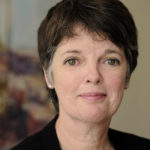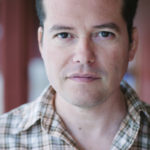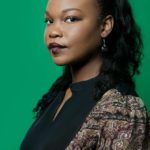On Saturday, October 26th, PEN/Faulkner hosted its 31st annual Gala at the Katzen Center for the Arts. The theme for the evening was “RISE UP!” and 10 incredibly talented writers wrote three-minute essays and poems about what those words meant to them. We were very lucky to be joined by such powerful voices. Here’s what they had to say. You can read the essays below in the order in which they were presented, or go straight to your favorite author by clicking on their name: Nell Freudenberger, Matt Klam, Alice McDermott, Francine Prose, José Rodríguez, Queenal Ayaba, Rachel Louise Snyder, Nafissa Thompson-Spires, Katrina Tracy, and Azareen Van der Vliet Oloomi.
 A few weeks ago, the New York Public Library asked me to speak to the conservators, a group of generous donors, about my recent novel. I was very grateful for the invitation–partly because I love the library, and partly because writing fiction entails spending a lot of time alone at a desk doubting yourself. For that reason, outside affirmation from institutions–like the incredible PEN/Faulkner Foundation that we’re celebrating tonight–is hugely meaningful for writers.
A few weeks ago, the New York Public Library asked me to speak to the conservators, a group of generous donors, about my recent novel. I was very grateful for the invitation–partly because I love the library, and partly because writing fiction entails spending a lot of time alone at a desk doubting yourself. For that reason, outside affirmation from institutions–like the incredible PEN/Faulkner Foundation that we’re celebrating tonight–is hugely meaningful for writers.
My novel is about a white physicist named Helen whose best friend, a black screenwriter named Charlie, has recently died. When I went on book tour to promote it, I expected questions about race. I worried that the reviews would take me to task for getting race, and racism, wrong. When I confided this worry to my sister, she said, “You’re white, the book has black characters, we live in a structurally racist society, you’re racist, I’m racist, we’re all racist, and of course there are going to be reviews like that.” She is a lawyer, and she tends to put things bluntly.
But the thing was, the reviews barely mentioned race. Almost none of the questions I got on tour touched on that subject, and when they did, they often lumped it together with gender, as if it was one, vaguely dirty word—why did you decide to write about raceandgender in this book? And so I wasn’t prepared for the conservators, a group of white people who seemed to want to talk about race to the exclusion of everything else. Specifically, several people wanted to know why “it was necessary” for Charlie to be black, what function it served in the plot.
To answer that question, I talked about Claudia Rankine’s advice for white authors, her suggestion that we could help chip away at the “white is normal” problem in fiction. I mentioned Jess Row’s recent book “White Flights,” which examines a turning away from the subject of race among white authors–what he calls “wishful thinking as a way of making art.” Some young library staff members jumped into the discussion to help question the idea that characters begin in whiteness, and only change their pigmentation according to the demands of narrative.
As we were talking, one of the current library fellows, a black American fiction writer, came out of his office and left the room, without giving our group a second glance. Probably he hadn’t heard us from inside his office; probably we were just a babble of voices, and he was still in that pleasant foggy state that exists between writing or reading and the rest of the world. That’s the place most writers would like to be most of the time. Who doesn’t prefer doing the work to sitting around talking about it?
And so, I think that ‘Rise Up’ might have different meanings depending on who you are. It certainly was that novelist’s prerogative to rise up out of his pneumatic desk chair and go home, or go out for a drink with friends after work, while I sat with the conservators, trying to explore why a character can be black without the plot hinging on her identity. I say this not to disparage any of those library donors who spoke up, or to presume what the quiet ones were thinking. The point is that this might be the job of the white writer now: a job that many of us, myself included, have taken too long to embrace, danced around too delicately. For us, rising up might really mean sitting down, both in the figurative sense of making room for everyone else, and the literal one, of sitting in rooms with our parents and grandparents, talking out the problems we inherited and the ones we have made ourselves.
Thank you.

600 years ago, in 1419, a priest led his congregation in protest through the streets of Prague but things got out of hand and they stormed the town hall and took the judge, the mayor, and several councilmen and threw them out a window where they fell to their deaths. When the King heard the news he died of shock. 80 years later, in the second ‘Defenestration of Prague’ (‘defenestration’ means to throw someone out a window) another mayor was tossed out a window, and 150 years after that two regents and a secretary were defenestrated — they fell 70 feet into a pile of manure and survived. This past July, I was at a writing conference and these incidents were mentioned in my workshop. All summer, I’d been in a panicky state of mind, and July was the hottest month every recorded, I’d been freaking out about mass extinction, burning rainforests, melting tundra, and the people in charge making it worse — and I was trying to keep it all inside because I felt angry and hopeless, and for the rest of that day I thought about who I’d throw out a window, reminding myself to clear the area below of manure.
That night — I was sitting on a bench eating ice cream, chatting with a poet friend who was also teaching a that conference. We discussed summer travels, writers we both knew who won awards they didn’t deserve, her incredible sex life because she’s young and single, then bumbled into an analysis of the psyche of a certain malignant, self-absorbed, shameless narcissist who’s been really tapping the patience of the universe lately — and fell silent. We were afraid. Hoping to lighten the mood, I tossed off one of those questions I sometimes use on friends. “If you could do something that you don’t do because it’s bad for you — but you could do it without any repercussions,” I asked, “what would you do?” I thought she’d say drink vodka for breakfast or fly to Spain. She looked at her ice cream and said, “I guess I’d kill a bunch of people.” Please note: this woman, this poet, has a big, boyish laugh, and has posed at least once for a publicity shot in a field of flowers. Her poems are personal strategies to understand American violence. It’s not exactly news that people are angry, but I was relieved to hear her articulate what I’d been feeling. I think this is what my favorite writers do — say what we can’t admit. And this is the challenge of our moment: Letting in the world, wishing we didn’t, but if we don’t we’re all alone. Then I told her how they used to handle it in Prague, and we made a list. And by honoring the feelings, not the impulses to action but the rage, fear, shame, and exhaustion behind those circling thoughts – at least for a moment then – I felt hope.

And then there’s this: I’m 5’2”. I know from long experience that if everybody rises up, I’m not going to see a thing. Just backs and backsides.
There’s a metaphor here, somewhere.
So I’m at one of those massive book festivals and I slip into the audience for a panel discussion by three young fiction writers. Ten minutes in, one of them declares from the stage, “I’m sick of novels about someone’s Irish grandmother.”
I sink down in my seat.
Another agrees, saying we’ve had too many immigration stories from white Europeans.
I sink further.
The third contends that the publishing world should declare a moratorium on such stories, make way for new voices, for the immigration experiences not yet described.
When the panel is over, I move toward the door, grateful that I’ve never been the kind of writer people recognize. But a woman stops me. We look somewhat alike, that is, there’s Irish in her DNA. “I thought you’d get up at the q&a,” she says. “I thought you’d tell them that all stories are valuable.”
I apologize, but argue for the novelists’ youth, their energy, their determination to be heard.
I can see I disappoint her. “Everybody needs to be heard, “ she insists.
I agree wholeheartedly. “But maybe not all at once,” I want to add.
Some months later, a reader sends me a review of a novel about Irish Americans in which the reviewer admits that a summary of the plot sounds “as fresh as a pint of last week’s Guinness.”
The reader asks me: Can you imagine the same kind of joke being made about the literature of any other nationality? By way of example, he offers some substitute words, offensive food slurs directed at other ethnicities. He urges me to write to the reviewer. Be aggrieved for us, he says. We have our grievances, too. Stand up for the Irish.
Similar entreaties arrive from Catholic readers who are tired of hearing their faith so easily maligned. Speak up for us, they say. I begin to wonder if I’m being asked to rise up, or to shout down.
My father, the orphaned child of Irish immigrants – I know, you’ve heard the story – was full of admiration for the Jewish kids in his New York neighborhood. Because they were the only other kids he ever saw in the library. Because they were always studying. The word Yeshiva, he liked to point out, means to sit.
“Before you shoot your mouth off,” he would tell us, “go sit in the library.”
Sitting is out of favor these days, I know. Although it is the assumed position of all of us who write, or read. And it’s a lovely verb: to sit, to occupy an official seat, to preside, to be still, to remain, to be fixed or settled. It provides the root for such words as: assiduous – to sit down to. Or dissent – to sit apart. Or séance – a sitting session meant to evoke spirits. And even – in the spirit of evoking spirits both liquid and ethereal – that wonderful word out of Irish folklore: banshee.
I’m reaching for a metaphor here, but it seems a simple proposition, one especially relevant to the cacophony of our aggrieved, combative times: there is wisdom in knowing when to rise up; there is wisdom, too, in knowing when to sit down.
 Every year, in my literature class at Bard college I try to teach at least one story or poem by a South American or Eastern European writer, Roberto Bolano, Mariana Enriquez, Zbigniew Herbert, Nadezdha Mandelstam, a story or poem in which authoritarianism is in the background or foreground, a story or poem that reminds my students how rapidly a society can change—overnight, in some cases—from a democracy to a dictatorship. I don’t know why it seems so important to make them think about the fragility of democracy. Forewarned is forearmed, I used to think, or anyway something like that.
Every year, in my literature class at Bard college I try to teach at least one story or poem by a South American or Eastern European writer, Roberto Bolano, Mariana Enriquez, Zbigniew Herbert, Nadezdha Mandelstam, a story or poem in which authoritarianism is in the background or foreground, a story or poem that reminds my students how rapidly a society can change—overnight, in some cases—from a democracy to a dictatorship. I don’t know why it seems so important to make them think about the fragility of democracy. Forewarned is forearmed, I used to think, or anyway something like that.
Always I used to say: we’re not there yet. One difference is: we’re not used to living in a society in which people just disappear. I tell them about the mothers standing, day after day, in the plaza in Santiago, Chile, with the photos of their children, missing for years, then decades. Or about the 43 students who disappeared in one night, only recently, in the Mexican state of Guerrero. The Argentine citizens who were dropped from helicopters over the sea, the Russians who vanished into the Gulag.
We’re not there yet, I’d say.
This summer, newspapers ran stories about 2000 children who had been separated from their parents at the US Mexican border and were unaccounted for. Have they disappeared? The stories about them have disappeared. And the children, the adults who languish in cages, in cells, sleeping on cement floors, covered by Mylar blankets. Have they disappeared? Do their families know where they are? Does anyone?
So we’re there now. It’s happening now, as we eat our delicious diners and gather to chat with our friends. It’s happening now, in our country, right now. Concentration camps. Our democracy is in danger.
Rise up.
 On Standing Before the Repurposed Warehouse in My Hometown
On Standing Before the Repurposed Warehouse in My Hometown
I would really like for the frog
To make an appearance. Its diminutive body
Slick with that permeable skin
Unexpectedly resting on the road,
Surely finding its way to the grassy patch
By the enormous warehouse.
Having just rained, the inch-long frog
Has come alive, rare and resurrected
From the sun-scorched earth of McAllen, Texas.
See, its presence reminds the speaker
Of his own childhood summers away from this town
All the way up in the Texas panhandle
With its onion fields, the pre-dawn shift, the burlap sacks,
The metal shears, and the frogs (entire communities
It seemed) unstoppable across the dirt rows.
Yes, this frog on the road should make an appearance
As some kind of symbol by the warehouse,
That cross-less compound down the street
From the speaker’s old middle school.
The galvanized steel walls,
The poles with the recognizable flags,
The front doors with the signs “No smoking within 10 feet of this entrance” and “No photography”
On the glass, tinted dark of course,
Chain link fence with privacy slats
Tall around the rest of the structure,
And the corner entrance with the motorized sliding gate
For the buses with the metal-barred windows,
Also tinted,
And the undocumented children silent in them.
I should warn you, their brown-eyed stare could break you.
Does it matter whether members of Congress
Have already shown up to see for themselves?
Let us say this fact is nonessential,
That it draws attention away from the purpose
And the speaker with his own Mexican memories
Of hunger and futile prayers. We must bring this back
To the poem’s charge –their foil wrappers,
Their recorded cries and coughs, their play pretend
Of calling each other hermano, hermana, madre –
Inadequate attempt against erasure –
Their blinding nights, their uniformed overseers,
Their bloodshot eyes.
Say we name every part of them, every last one,
That we might reconstitute something
Of who they were before this –
The long walk, the despair,
The sacking of their country’s mines –
Might it be like touching the hand of God?
And if we called out their names
All the ones dead and dying
Felipe Gomez Alonso
Carlos Gregorio Hernandez Vasquez
Jakelin Caal Maquin
Mariee Juarez
Josue Ramirez Vasquez
Darlyn Valle
Juan De Leon Gutierrez [1]
Could they then rise up from the concrete floor,
Past the cages, the eye-burning ceiling lights,
Past the flags, the reach of the city’s thrum,
Until they turned to see it all
And remembered the beauty they once were?
[1] Names taken from article “Why are migrant children dying in US custody?” by Nicole Acevedo, 5/29/2019, nbcnews.com
 The Lion Anger Has Resurrected
The Lion Anger Has Resurrected
My homeland lived a happy life for years until 2016 after I left. I was just 14 when I left Cameroon to come to the United States. A few months after my departure to the U.S., teachers and lawyers from the English-speaking regions of Cameroon decided to lead a strike because they had been marginalized for many years. I thought everything would be okay after the strike, but I had no idea that it was the beginning of a war.
The sorrow that built up in me started to melt. Each day, my friends from Cameroon sent me video clips about people being killed like birds being hunted.
You could see the veins and skeletons of people laying on the floor; some had deep holes in their heads to the point that you could see the eyes staring at you like they wanted revenge. The water that had been held deep in my eyes started pouring out and dripping on the ground like stormy rain.
“Make we na come oh.”
“Ma house di burn.”
“They don finish me oh. Ma pickin don die. They don burn my house.”
“Watti I don do?” said a man in one of the videos sent to me by my friend.
Sometimes seeing children witnessing their parents being killed, and some losing their homes, terrified the anger in me. Communities were completely vacated to the point where you could only smell the dust of innocent dead souls crying for revenge.
Each day, many family members lost their young boys or men because the men of our land were mostly targeted by the French Cameroon armies. A huge percentage of the population, especially women and children, suffered from starvation, lack of water, and no access to healthcare.
Sometimes, armed men attacked schools in the English regions, and one week wounded more than 20 people, including children. Throughout the torture that I faced seeing the spirits of the innocent dead, weeping and crying, I knew deep in me that there was a cheetah who wanted to rise up and make a change, but I did not know how. The ashes that held together firmly in the fire started flaking off.
“Where is the flame that is burning in me,” I said. I could not bear to see more houses burning and people fleeing from their homes and villages.
The rage in me arose when I saw women being raped and executed randomly.
Only a few people each day had the chance to flee and find shelter in the jungle despite the wild animals that live there. I knew at this point that holding back my pain would not be a solution. As an Ambazonia, the sorrow in me already evaporated. I could not stand all the tears from my lost ones and their voices speaking to me. Les yeux étaient rouges comme du feu.
As an English Cameroonian, I felt like I was spiritually with those in Cameroon that were standing up for their freedom with confidence. No sitting back, for the power in us was like a lion that was ready to unceasingly killed many gazelles, hares, and other animals. We were never bound to join up with the French Cameroon as one community. For the ancestors of the past signed a treaty with them guaranteeing the respect of our cultural identity.
I felt like the tears of the dead babies that had been killed by the French armies and that started haunting the armies; for they cry deeply in the army’s ears day and night and haunt them in spirit. We have become each and everyone’s leader, protesting for our freedom, and fighting for what belongs to us, including our land and lives. We cannot let troops of the French armies escalate on our backs and arrest all our main important leaders.
For the young men of our land called the Amba boys — the Red Dragons — and Tigers have risen up to defend us Ambazonians. They have built up an army with rockets on their backs and sprung up, ready to fight for the independence of us Ambazonians.
Each day in the videos, I hear gunshots from the Amba boys back and forth with the armies on the other side, while people close their doors and windows, looking for a safe spot under their beds.
 Rise Up: Cambodia
Rise Up: Cambodia
The third floor of the Tuol Sleng Genocide Museum is closed to the public. Crude cells cobbled from splintering wood or brick make up the first two floors, along with a small museum of photos and information about the 1975-79 genocide. Once, there was a map of Cambodia from human skulls on the wall, but the map has been moved, to the outskirts of the city onto the most well-known killing field. I say well-known because there are many killing fields. There are killing fields in far reaches of the countryside that are only partially cleared. When I lived around the corner from Tuol Sleng, there was no public explanation for why the top floor was closed, but my neighbors needed no explanation. The third floor, they said, was thick with ghosts.
One day, I paid the entry fee, and snuck up to the third floor. It was a spontaneous decision. There were crumpled up receipts, palm fronds and dead leaves from flame trees and enormous dust balls and crushed cans of Beer Lao. A television antenna, yellow plastic bags, a smattering of straws. As on the other floors, the ochre and white tile bore dark stains that some say is blood, but after so many decades is more likely mold. The shutters cracked the bright sun into lattice on the floor.
The neighbors laughed when I told them I’d gone to the third floor of Tuol Sleng and then they asked why? Why would I do such a thing? They told me I had disrupted the ghosts. There was no telling what might happen now.
Cambodians, by and large, do not fear ghosts. Rather, ghosts are like trees: ubiquitous, necessary and even urgent for sustained life. But they can also grow gnarled, interfering with nature in obstinate ways.
By the time I’d lived in Cambodia for a year or two, I grew used to the busloads of Australian and Chinese tourists who emerged from Tuol Sleng in stunned silence. After five pm, though, when Tuol Sleng-the-genocide-museum closed, Tuol Sleng-the-night-parking-garage opened. For two thousand riel, or fifty cents, we could park our cars there so long as they were gone by morning. Our neighbors kept Camrys and Land Rovers there. We’d knock at the gate, and guards would roll out of their hammocks to direct us by flashlight. A television hooked up to a car battery entertained them with soccer late into the night.
The ghosts were there, I knew, but quiet, understanding perhaps that the necessary and urgent utilitarian need of a new generation can summon its own kind of reclamation.
 I can’t remember the first time I got in trouble for something I said, but it was likely a pre-language facial expression, a half-smile misinterpreted as a frown, or a look in my eyes that suggested disrespect. In preschool, I was paddled for talking during naptime at a private school that still used corporal punishment. Saying the wrong thing got me booted from kindergarten, literally less than a week into the new school year, when I lamented that the teacher did not give us the homework I had come to expect at my Montessory-style preschool. That teacher held a meeting with my parents and the principal to have me tested (read: removed from her class) and pawned off on the first-grade teacher.
I can’t remember the first time I got in trouble for something I said, but it was likely a pre-language facial expression, a half-smile misinterpreted as a frown, or a look in my eyes that suggested disrespect. In preschool, I was paddled for talking during naptime at a private school that still used corporal punishment. Saying the wrong thing got me booted from kindergarten, literally less than a week into the new school year, when I lamented that the teacher did not give us the homework I had come to expect at my Montessory-style preschool. That teacher held a meeting with my parents and the principal to have me tested (read: removed from her class) and pawned off on the first-grade teacher.
But precocious, inquisitive five-year-olds were not welcome in first grade either, which came with the homework I requested but also a mousy teacher’s aid with a Trunchbull knack for embarrassing children. If you spoke while Ms. Ivey was speaking or if you said anything she didn’t want you to say—and the broad ambiguity of the latter category posed the issue for me—she punished you by forcing you to wear a giant red mouth, mimeographed, cut out, and carefully laminated, complete with elastic red band to secure the mask over your mouth and ears.
Never mind how it would look for a white teacher to make the handful of black kids in our grade wear the oversized overly red lips we grew up seeing on the random cartoon coons they forgot to censor from our Bugs Bunny and Tom and Jerry reruns. This teacher believed in colorblindness and equal-opportunity law enforcement. She had washed her own white son’s mouth out with liquid bathroom soap at school when he used a PG curse word, so I—black, unrelated to her, and already labeled a problem, smart but a problem—was certain to end up wearing those red lips. My previous goals of beating everybody at everything gave way to a new one: avoiding being forced to wear the mask riddled with the germ strains of a dozen other six-year-olds. Somehow I dodged wearing the lips while also placing in the speech competition that year.
But later, at a different Christian school, I was not so successful. There, I learned a host of things could get one—me—sent to the principal’s office: using, for instance, the words or “weenie” or “racist.” I received nearly the same punishment for chewing gum outside of the classroom as a white student did for wearing blackface on Halloween. And on the books, his official crime was mooning someone, not the brown face paint he wore while pulling down his pants. In high school, when I reported a student for calling one of the only black girls on our campus a racial slur, the principal called me in not to thank me for bravely coming forward but to explain that black people, too, could be racist. I don’t believe Brian, the student who used the slur was ever punished. And I know my school did nothing to the group of nerdy boys and girls I had known since elementary school, who, around the time of Columbine, suddenly started wearing black trench coats and chanting “white power.”
But I learned a valuable lesson from those red lips and the cowardly, misguided chastisement of the administrators in my life. I learned not to stifle, as these institutions wanted me to do, but instead that there was no amount of stifling that would ever make me acceptable, and thus, I could become louder, angrier, scarier, more problematic, and still be treated the exact same way as I was when I tried to be respectable, to shrink myself down, to avoid humiliation or reprimand. What I’m trying to say is that I ended up wearing those big red lips no matter what I did. Respectability, I intuited—though I have to frequently recall this lesson—doesn’t protect you from the insidiousness of the white gaze or the inherent all-encompassing violence of white supremacy.
As more and more tenured academics, university administrators, and journalists are losing their jobs for stating facts about racism, our presidency, queerphobia, and Islamaphobia, the threats of retribution are only intensifying. Students a few weeks ago burned the books of Jenine Capo Crucet. The message, everywhere, is clear: you will be humiliated for telling the truth; you will be punished. But more than ever is the time to speak up, to shake off the choking fear.
In addition to teaching at a university, where race, racism, and the importance of ethical writing are foundational to my pedagogy, I now get paid to visit campuses, often predominantly white, and talk about these issues. (In other words, I get paid, well, to upset racists). And nothing could have prepared me more for the hostile eyes I sometimes encounter on these campuses, for the people who play devil’s advocate with the facts of my humanity during Q&A sessions, than that red laminated lip mask. The threat of that mask freed me, started to unbutton me, even at the age of five, from my starched childhood. It unmoored, year by year, my deep fear of disapproval. It taught me that being pointed and laughed at is a terrible feeling, indeed, but a worse one is knowing exactly what is right and choosing not to act for fear. I reject, then, both the discursively violent mask and its more perfidious performative power, the self-subjugation of silence. And doing so, I hope, has and will make all the difference.
 Sometimes You Stick Out
Sometimes You Stick Out
As a Russian-American, I go to Russia every other year to see family, and with every passing year, I feel more disconnected. Maybe it’s because I don’t speak perfect Russian, or maybe because my brother speaks even worse Russian than I do. Perhaps it’s because of the political tension that has been between our two countries for decades, now instigated by conspiracies and political comments.
We go to Serpukhov, a place that sees little foreigners. It recently got inducted into the golden ring, the name of cities that have special tours, this year. Everyone just assumes everyone is from around there, or at least from Russia.
My brother and I were swinging on the swings. My shirt stuck to my back, the sky was blue, with fluffy clouds overhead. A cloud passed, throwing us into shade. A boy and a girl came to the playground. The boy was tapping away at a phone. The girl occupied herself with the seesaw.
After a while we did the usual introductions, and maybe because of our small accents and stumbles, they asked us where we were from.
It felt like I was walking around with a sign on my forehead that read, “American.”
Maybe I could lie and say I’m from Kyrgyzstan–technically true, my mother grew up there–but I didn’t know any Kyrgyz and what if they asked? So after a second of deliberation, I reluctantly said it.
“I’m from America.” My brother liked the attention they gave us then, their faces had a look of almost-masked shock, changing into a calculating look. Like, “What questions do you think we can get away with?” I gritted my teeth and hoped my brother didn’t say anything silly.
“What type of car do you have?” The boy started.
“A Honda.” If I had met someone from a country I had never been to, I would ask more interesting questions, like about the differences in weather, or what language is spoken.
“Hmmm, well I guess that’s a respectable car.” He peered at me disapprovingly, as if saying, do better. “What car does your mom drive?”
“We only have one car.” I said. Staring at me in shock, he swiftly changed to another topic.
“Who is cooler, Obama or Putin?” Honestly, I can’t remember what I answered. I wanted to fit in, so I struggled with the question.
Either way, he wouldn’t believe me. All he would remember from that exchange was that we were Americans. I hated it. All I wanted was to be “normal.” There, in Russia, I will always be the odd one out.
“Anton!” I called my brother. “We have to get home, sorry.” I told him. He started to protest, but I took him by the arm, leading him away from their piercing eyes, looking at me like I was an elaborate vase on display. But they weren’t looking at how intricate and colorful the vase was. They were looking at the price tag.
Hurrying into the apartment I quickly shut the door behind us. My grandmother’s apartment was small, so I got to the window quickly.
Stealing glances, I saw they were still there. I would go outside to play only when they were gone.
I flopped onto the couch. Most kids I had met in Russia were perfectly nice. They would let it drop after I would explain, “We are visiting our grandmother.” I would tell my brother, “Don’t say anything about where we are from, let me talk if they ask.”
When we go to Moscow or other cities, it isn’t strange to see someone who isn’t Russian. But every so often, a person will stare at you, or come up to you and tell you that they have never met an American before. That hurts.
I don’t want to be singled out like that. Can’t people understand I’m just like them?
Later, I found myself thinking about those kids, and what they had said. In America, I never shy away from the fact that I’m Russian. Why should this be any different? I was tired of evading questions.
When I go back again, I will rise up. I am American. But no less Russian. I hope I can summon the courage not to hide. I won’t tell everyone, shouting it around the street, but if someone asks, I won’t tell a half-truth like I have before. I am proud, and I hope I can teach my brother to rise up and be proud, too.

We are unable to post Azareen’s piece at this time as it is still in the publication process. Stay tuned for more information!
